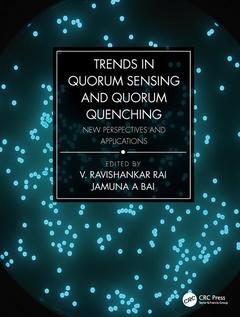Description
Trends in Quorum Sensing and Quorum Quenching
New Perspectives and Applications
Coordinators: Rai V. Ravishankar, Bai Jamuna A
Language: English
Subjects for Trends in Quorum Sensing and Quorum Quenching:
Keywords
QS System; biofouling; AHL Synthase; bacterial infections; Biofilm Formation; flora inhabiting biodiversity; QS Signal; quorum sensing inhibitors; QS Inhibitor; quorum quenching enzymes; QS Mechanism; QS Gene; AHL; QS Signal Molecule; QS Molecule; QS; Qq Activity; Biosensor Strains; EPS Production; anti-QS Activity; Violacein Produced; Virulence Factors; Membrane Biofouling; QS Regulation; Qq; Aeruginosa PAO1; LuxR Homologue; MBR; QSI Activity; Long Chain AHLs
· 21x28 cm · Hardback
Description
/li>Contents
/li>Biography
/li>
The book on Trends in Quorum Sensing and Quorum Quenching: New Perspectives and Applications focuses on the recent advances in the field of quorum sensing in bacteria and the novel strategies developed for quorum sensing inhibition. The topics covered are multidisciplinary and wide-ranging,and includes quorum sensing phenomenon in pathogenic bacteria, food spoilers, and agriculturally relevant bacteria. The applications of quorum sensing inhibitors such as small molecules, bioactives, natural compounds, and quorum quenching enzymes in controlling bacterial infections in clinical settings, agriculture and aquaculture are discussed. The potential use of quorum quenching enzymes for mitigating biofouling is also covered. Special focus is given to exploring quorum sensing inhibitors from microbes and flora inhabiting biodiversity rich regions including tropical rain forests and marine environments.
Key features:
- Covers the fundamental aspects, the progress and challenges in the field of quorum sensing and quorum quenching
- Reviews quorum sensing in Gram-positive and Gram-negative bacteria of clinical, agricultural, and industrial relevance
- Discusses the application and future trends of quorum sensing inhibitors from lab to clinical and environmental settings
- Provides comprehensive coverage on molecular mechanisms in bacterial signaling
1. Expanding Roles and Regulatory Networks of LadS/RetS in Pseudomonas aeruginosa 2. Autoinducer-1 Quorum Sensing Communication Mechanism in Gram-Negative Bacteria 3. Toward a Systematic Genomic Survey of Bacterial Quorum Sensing Genes: Cross Cutting Regulatory and Genomic Concepts 4. Old Acquaintances in a New Role: Regulation of Bacterial Communication Systems by Fatty Acids 5. Analysis of Quorum Sensing by Surface-Enhanced Raman Scattering Spectroscopy 6. Quorum Sensing in Pseudomonas aeruginosa: From Gene and Metabolic Networks to Bacterial Pathogenesis 7. Quorum Sensing in Vibrios 8. Quorum Sensing in Lactic Acid Bacteria 9. Role of N-acyl-homoserine Lactone QS Signals in Bacteria-Plant Interactions 10. Quorum Sensing and the Environment: Open Questions in Plant-Associated Bacteria 11. In Silico Mining of Quorum Sensing Genes in Genomes and Metagenomes for Ecological and Evolutionary Studies 12. Bacterial Quorum Sensing in Multispecies Communities: The Presence, Functions and Applications 13. Breaking Bad: Understanding How Bacterial Communication Regulates Biofilm-Related Oral Diseases 14. Quorum Sensing in Autotrophic Nitrogen Removal Systems for Wastewater Treatment 15. Mechanism and Types of Quorum Sensing Inhibitors 16. Role of Small Volatile Signaling Molecules in the Regulation of Bacterial Antibiotic Resistance and Quorum Sensing Systems 17. Recent Advances in Science of Quorum Sensing: An Overview of Natural Product Inhibitors 18. Nanomaterials as Quorum Sensing Inhibitors 19. Phytochemical Compounds Targeting the Quorum Sensing System as a Tool to Reduce the Virulence Factors of Food Pathogenic Bacteria 20. Targeting Bacterial Communication to Improve Bacterial Infections Therapy: Implications for Phage-Based Treatments—A Mathematical Perspective 21. Quorum Quenching Monoclonal Antibodies for the Detection and Treatment of Gram-Negative Bacterial Infections 22. Novel Intervention Techniques in the Food Industry 23. Quorum Sensing and Quorum Quenching in Food-Related Bacteria 24. Quorum Quenching as an Anti-biofouling Strategy for Wastewater Reuse and Biofouling Affected Industries 25. Application of Quorum Sensing Inhibitors in Anti-biofouling Membranes 26. Quorum Sensing and Quorum Quenching Based Antifouling Mechanism: A Paradigm Shift for Biofouling Mitigation in a Membrane Bioreactor (MBR) 27. Application of Quorum Quenching in the Control of Animal Bacterial Pathogens
Prof. Ravishankar Rai V received his M. Sc (1980) and Ph. D (1989) from University of Mysore, India. Currently, he is workingat the Department of Studies in Microbiology, University of Mysore, Mysore. His current research and publications in the food microbiology, microbial quorum sensing, microbial influenced corrosion and nanotechnology has been well received by the international scientific committee. His series of edited books with reputed publishers such as CRC Press and Wiley publications: Biotechnology: Concepts and Applications (2009), Microbial Food Safety and Preservation Techniques (2014), Beneficial Microbes in Fermented and Functional Foods (2014), Advances in Food Biotechnology (2015), Food Safety and Protection (2016) and Nanotechnology Applications in the Food Industry (2018) are comprehensive in nature and have contributions from international experts in the field. Prof. Rai has received awards from UNESCO Biotechnology Action Council Programme (Visiting Fellow, 1996), UGC Indo- Israel Culture Exchange Programme (1998), DBT Overseas Fellowship (2008), Indo- Hungarian Educational Exchange Programme fellowship (2011) and INSA – bilateral exchange fellowship (2015), Incoming Fellowship (2017) from Cardiff University, UK and invitation from Mauritius Research Council, Mauritius (2018) to conduct collaborative research with renowned scientists from international Universities. He has been awarded Bilateral Exchange Fellowship by Indian National Academy of Sciences to visit Germany (2019), Cambridge-Hamied Visiting Lecture Scheme (2019).
Jamuna A. Bai has completed her MSc and PhD in Microbiology from University of Mysore, India. She is working as a Researcher in UGC sponsored University with Potential Excellence Project, University of Mysore, India. She has previously worked as ICMR Senior Research Fellow and carried research work on food safety, role of quorum sensing and biofilms in food-related bacteria and de




